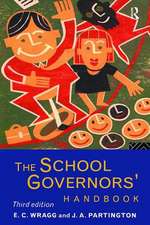Beyond Stories: Young Children's Nonfiction Composition
Autor Susan Britschen Limba Engleză Paperback – 20 iun 2002
| Toate formatele și edițiile | Preț | Express |
|---|---|---|
| Paperback (1) | 91.83 lei 43-57 zile | |
| Taylor & Francis – 20 iun 2002 | 91.83 lei 43-57 zile | |
| Hardback (1) | 625.03 lei 43-57 zile | |
| Taylor & Francis – 12 iul 2017 | 625.03 lei 43-57 zile |
Preț: 91.83 lei
Nou
Puncte Express: 138
Preț estimativ în valută:
17.58€ • 19.10$ • 14.77£
17.58€ • 19.10$ • 14.77£
Carte tipărită la comandă
Livrare economică 21 aprilie-05 mai
Preluare comenzi: 021 569.72.76
Specificații
ISBN-13: 9781930556409
ISBN-10: 1930556403
Pagini: 172
Ilustrații: black & white illustrations, black & white tables
Dimensiuni: 152 x 229 x 13 mm
Greutate: 0.29 kg
Ediția:1
Editura: Taylor & Francis
Colecția Routledge
Locul publicării:Oxford, United Kingdom
ISBN-10: 1930556403
Pagini: 172
Ilustrații: black & white illustrations, black & white tables
Dimensiuni: 152 x 229 x 13 mm
Greutate: 0.29 kg
Ediția:1
Editura: Taylor & Francis
Colecția Routledge
Locul publicării:Oxford, United Kingdom
Public țintă
Professional Practice & DevelopmentCuprins
Chapter 1 “It’s Not a Story”; Chapter 2 “‘I Hope You Feel Better’ and Raindrops and Rain Clouds”—; Chapter 3 Composing Choices; Chapter 4 “What Happens to the BEE?”; Chapter 5 The Role of Reading; Chapter 6 Assessment as a Nonjudgmental Process;
Notă biografică
Susan J. Britsch is associate professor of Literacy and Language Education in the Department of Curriculum and Instruction at Purdue University. A former preschool teacher, her interests include the development of children’s original storytelling, children’s writing in nonfiction genres, and the integration of science and literacy curricula in elementary schools. She has published numerous academic articles about children’s language and literacy development and about the ways in which teachers can take a research perspective to young children’s literate behavior in classrooms.
Descriere
Descriere de la o altă ediție sau format:
The League of Nations - pre-cursor to the United Nations - was founded in 1919 as a response to the First World War to ensure collective security and prevent the outbreak of future wars. It was set up to facilitate diplomacy in the face of future international conflict, but also to work towards eradicating the very causes of war by promoting social and economic justice. The philosophy behind much of the League's fascinating and varied roles was to help create satisfied populations who would reject future threats to the peace of their world. In this new volume for Seminar Studies, Martyn Housden sets out to balance the League's work in settling disputes, international security and disarmament with an analysis of its achievements in social and economic fields. He explores the individual contributions of founding members of the League, such as Fridtjof Nansen, Ludwik Rajchman, Rachel Crowdy, Robert Cecil and Jan Smuts, whose humanitarian work laid the foundations for the later successes of the United Nations in such areas as:the welfare of vulnerable people, especially prisoners of war and refugees dealing with epidemic diseases and promoting good health anti-drugs campaigns Supported by previously unpublished documents and photographs, this book illustrates how an understanding of the League of Nations, its achievements and its ultimate failure to stop the Second World War, is central to our understanding of diplomacy and international relations in the Inter-War period.
The League of Nations - pre-cursor to the United Nations - was founded in 1919 as a response to the First World War to ensure collective security and prevent the outbreak of future wars. It was set up to facilitate diplomacy in the face of future international conflict, but also to work towards eradicating the very causes of war by promoting social and economic justice. The philosophy behind much of the League's fascinating and varied roles was to help create satisfied populations who would reject future threats to the peace of their world. In this new volume for Seminar Studies, Martyn Housden sets out to balance the League's work in settling disputes, international security and disarmament with an analysis of its achievements in social and economic fields. He explores the individual contributions of founding members of the League, such as Fridtjof Nansen, Ludwik Rajchman, Rachel Crowdy, Robert Cecil and Jan Smuts, whose humanitarian work laid the foundations for the later successes of the United Nations in such areas as:the welfare of vulnerable people, especially prisoners of war and refugees dealing with epidemic diseases and promoting good health anti-drugs campaigns Supported by previously unpublished documents and photographs, this book illustrates how an understanding of the League of Nations, its achievements and its ultimate failure to stop the Second World War, is central to our understanding of diplomacy and international relations in the Inter-War period.

